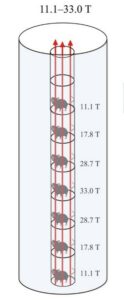Dnia 2022.11.22 (wtorek) o godzinie 13.15, odbędzie się w sali 2011 Wydziału Fizyki seminarium na którym prof. dr hab. Vitalii Zablotskii z Institute of Physics of the Czech Academy of Sciences, Prague, Czech Republic i International Magnetobiology Frontier Research Center (iMFRC), Science Island, China wygłosi wykład:
Serdecznie zapraszamy
Andrzej Maziewski
Jerzy Przeszowski
Vitalii Zablotskii
Institute of Physics of the Czech Academy of Sciences, Prague, Czech Republic. International Magnetobiology Frontier Research Center (iMFRC), Science Island, China
Magnetobiology and Magnetomedicine: Effects of High Magnetic Fields on Living Organisms
 The biological and therapeutic effects of low magnetic fields have been the subject of numerous studies for over a hundred years. However, investigations of the biological effects of moderate and high magnetic fields are still at an early stage. Several new biological and therapeutic effects of moderate and high magnetic fields (MFs) will be discussed. Effects of a high static MF on lung cancer-bearing mice were examined in [1]. In mice treated 88 h with a 9.4 T static magnetic field, tumor growth and DNA synthesis were significantly inhibited, G2 cell cycle was arrested, while the ROS and P53 levels were increased. Surprisingly, the application of ultra-high static MF (up to 33 T) causes an anti-depressive effect on mice, enhancing the levels of oxytocin and c-Fos in the mice’s brains [2]. Of note, this was the first attempt to apply such ultrahigh static magnetic fields to living organisms. A putative mechanism based on magnetic pressure has been proposed that may be responsible for the elevated levels of oxytocin, the happiness hormone [2]. It is important for clinical applications to treat a number of myopathies associated with the defective calcium regulation in muscle cells that exposure of skeletal muscle cells to a complex spatiotemporally modulated 70 mT magnetic field triggers a significant increase in cytosolic Ca2+ levels leading to actin polymerization [3]. The influence of spatially modulated high gradient MFs on cellular functions of human THP-1 leukemia cells was studied in [4]. Here, it was shown that a high-gradient moderate MF can: i) induce cell swelling, ii) increase prolonged ROS production, iii) inhibit cell proliferation, and iv) elicit apoptosis of THP-1 monocytic leukemia cells in the absence of chemical or biological agents. A high static MF can control the diffusion of biologically active molecules including oxygen, hemoglobin, and drugs, thereby affecting many physiological processes in organisms, e.g., wound healing [5].
The biological and therapeutic effects of low magnetic fields have been the subject of numerous studies for over a hundred years. However, investigations of the biological effects of moderate and high magnetic fields are still at an early stage. Several new biological and therapeutic effects of moderate and high magnetic fields (MFs) will be discussed. Effects of a high static MF on lung cancer-bearing mice were examined in [1]. In mice treated 88 h with a 9.4 T static magnetic field, tumor growth and DNA synthesis were significantly inhibited, G2 cell cycle was arrested, while the ROS and P53 levels were increased. Surprisingly, the application of ultra-high static MF (up to 33 T) causes an anti-depressive effect on mice, enhancing the levels of oxytocin and c-Fos in the mice’s brains [2]. Of note, this was the first attempt to apply such ultrahigh static magnetic fields to living organisms. A putative mechanism based on magnetic pressure has been proposed that may be responsible for the elevated levels of oxytocin, the happiness hormone [2]. It is important for clinical applications to treat a number of myopathies associated with the defective calcium regulation in muscle cells that exposure of skeletal muscle cells to a complex spatiotemporally modulated 70 mT magnetic field triggers a significant increase in cytosolic Ca2+ levels leading to actin polymerization [3]. The influence of spatially modulated high gradient MFs on cellular functions of human THP-1 leukemia cells was studied in [4]. Here, it was shown that a high-gradient moderate MF can: i) induce cell swelling, ii) increase prolonged ROS production, iii) inhibit cell proliferation, and iv) elicit apoptosis of THP-1 monocytic leukemia cells in the absence of chemical or biological agents. A high static MF can control the diffusion of biologically active molecules including oxygen, hemoglobin, and drugs, thereby affecting many physiological processes in organisms, e.g., wound healing [5].
[1] Yang X., Song C., Zhang L., Wang J., Yu X., Yu B., Zablotskii V., Zhang X. An upward 9.4 T static magnetic field inhibits DNA synthesis and increases ROS-P53 to suppress lung cancer growth. Translational Oncology. 2021, 14 (7), 101103.
[2] Lv, Y., Fan, Y., Tian, X., Yu, B., Song, C., Feng, C., Zhang, L., Ji, X., Zablotskii, V., Zhang, X. (2022), The Anti-Depressive Effects of Ultra-High Static Magnetic Field. J Magn Reson Imaging. 2022, 56: 354.
[3] Ayala M.R., Syrovets T., Hafner S., Zablotskii V., Dejneka A., Simmet Th. Spatiotemporal magnetic fields enhance cytosolic Ca2+ levels and induce actin polymerization via activation of voltage-gated sodium channels in skeletal muscle cells, Biomaterials, 2018, 163, 174.
[4] Zablotskii V., Syrovets T., Schmidt Z.W., Dejneka A., Simmet Th. Modulation of monocytic leukemia cell function and survival by high gradient magnetic fields and mathematical modeling studies, Biomaterials, 2014, 35 (10), 3164.
[5] Zablotskii, V., Polyakova, T., Dejneka, A. Effects of High Magnetic Fields on the Diffusion of Biologically Active Molecules. Cells. 2022, 11, 81.
W ramach naszego serwisu www stosujemy pliki cookies zapisywane na urządzeniu użytkownika w celu dostosowania zachowania serwisu do indywidualnych preferencji użytkownika oraz w celach statystycznych. Użytkownik ma możliwość samodzielnej zmiany ustawień dotyczących cookies w swojej przeglądarce internetowej. Więcej informacji można znaleźć w Polityce Prywatności Uniwersytetu w Białymstoku. Korzystając ze strony wyrażają Państwo zgodę na używanie plików cookies, zgodnie z ustawieniami przeglądarki.